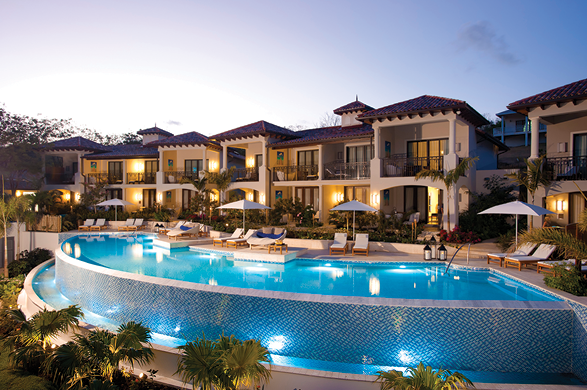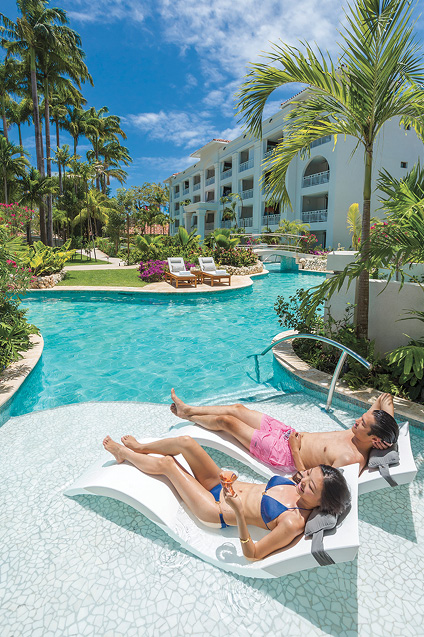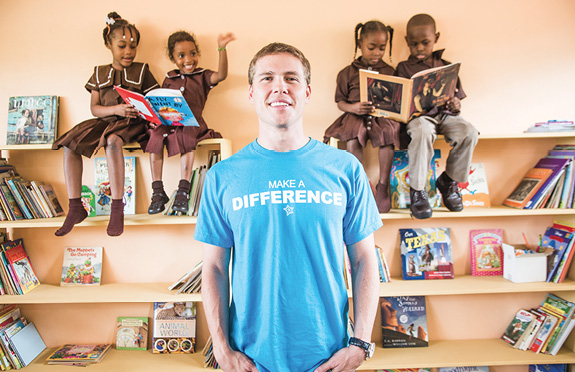- Home
- Media Kit
- Current Issue
- Past Issues
- Ad Specs-Submission
- Ad Print Settings
- Reprints (PDF)
- Photo Specifications (PDF)
- Contact Us

![]()
ONLINE

Creating Uniquely Special Properties
Editors’ Note
Adam Stewart has held his current post since November 2006. Stewart oversees all areas of operations for the 34-year-old resort empire founded by his legendary father Gordon “Butch” Stewart. Prior to becoming CEO, he was Director of Resort Product, responsible for all on-property operations and revenues across the company’s three major brands: Sandals Resorts, Beaches Resorts, and Grand Pineapple Beach Resorts. A member of the Sandals Resorts International Executive Committee, Stewart also served as Chairman of the Sandals’ Youth Committee and is currently the President of the Board for the Sandals Foundation, Inc. He was raised in Jamaica and graduated from Florida International University’s Hospitality Management Program before implementing his knowledge in various departments within Sandals Resorts International.
Company Brief
Family-owned Sandals Resorts International (sandals.com) has transformed itself from one brand and one resort in Montego Bay, Jamaica to one of the most well-known and award-winning hospitality companies in the world. With five brands and 24 properties in seven countries including Antigua, The Bahamas, Grenada, Barbados, Jamaica, Saint Lucia, and Turks and Caicos, Sandals Resorts International is the undisputed leader of Caribbean luxury vacation experiences and remains fiercely committed to the region, dedicating itself to innovative resort development that in the words of Chairman and Founder Gordon “Butch” Stewart, “exceeds expectations” for guests, associates, and the people who call the Caribbean home.
What has kept the brands so relevant after all this time?
The company is still young and a lot of the leadership that is here started with it in its early days. We have people in their 50s who are very potent leaders, still very much hands-on with the operation and talking with consumers. They still have a lot of miles left on their clocks but they have 20-odd years of tenure under their belts. They have been a part of the evolution of the company, having gone from fairly simple beginnings to the sophisticated all-inclusive product it is today.
There is that almost shareholder emotion and passion that come out of the leadership of our team, and it comes from the fact that they’ve built it. Looking ahead, these guys are the most potent industry leaders out there to take the company to the next level. Much of it is that family and leadership feel. We have execs who are new to the team but a guy who has been with us 15 years still tends to be looked at as a rookie.

Sandals LaSource Grenada
How do you define what Sandals stands for today? Is it as much in that high-end as the mass market?
Overall, people tend to consider us a lifestyle product – for guests, it’s about doing what they want when they want, and so much starts with Grade ‘A’ real estate.
We put a lot of time into scouting locations. We can go into a destination where the government will show us land, but it starts with finding a magical spot with protected beaches and beautiful, powdery white sand – that’s the first sign that any discerning traveler will know as soon as they arrive at their hotel, that they’re standing on prominent real estate. From there, Sandals unfolds in a number of ways.
The food and beverage side is a major deal – a la carte service, and a variety of cuisines; never building a food court operation, but offering stand-alone, multimillion-dollar food and beverage outlets.
We have palatial pools and our water sports operations don’t just offer scuba diving but water skiing and sailing. People are busy and when they come to our resorts we want to make sure that, no matter what is going on with the weather, they truly get the vacation they paid for. Other resorts build on the open ocean but sometimes they can’t use it because it’s too rough. That has become the brand standard of Sandals: this fantastic real estate.
Wellness is also such a big part of everything we do – the spa, the fitness facilities, the jogging trails, the whole combination. The resorts are very social and include things like the swim-up pool bar, which Sandals was the first to build in the Western Hemisphere, and we brand them the party pools. The product has become more sophisticated, so while the programming of the hotel is such that there is always an activated part of the property for the guests who want to be in that party mood or be entertained, there are other parts of the property where they can disappear and have nobody disturb them. It’s normal for us, it’s what we do, but it’s not normal in the industry.
In terms of room accommodations, we’re spending upwards of $500,000 on a key to develop rooms. Our later development in Barbados hit an all-time high of $725,000 per key. This is for the typical room, not the over-the-water bungalows; those are coming in at $1.5 million a key.
We tend to put the money forward into the experience, so the LED TVs and the bottle service goes along with it, as well as the overall finishes. The consumer then feels he got value for his money through every touch point.
Sandals is the most expensive in the all-inclusive category for a reason. We have a higher restaurant-to-room ratio than any of our competitors and we offer more services.
How important has the training side and service component been?
Training has been a centerpiece of Sandals for many years – it was founded by our managing director and chairman. Our managing director, who is now retired, still comes to work every day. He believes in training people and giving people opportunity. It is fun for us to see how much more sophisticated the training has become and how comprehensive it is; we have over 500 different tracks with Sandals Corporate University. It’s a living, breathing institution that aligns with industry-leading international universities – we have 12 partners around the world, all specialists in the hospitality and lodging space.
We combine their theory with our practical, on-the-ground experiences. One can literally not be able to read and write but have a great attitude, and we’re prepared to train that individual.

Sandals Barbados Crystal Lagoon Pool
For every level of the business, be it a bartender or an executive, there are tracks fully paid for by the company to take people to the next level, to prepare them for the future growth of the company. We have watched individuals rise and they get achievement after achievement.
We have now 600 kids in the Hospitality Training Program. We work with the Caribbean governments on this program. These kids are still in school and we put them on a six-week, all-paid internship to expose them to the industry. It exposes them to hospitality in ways they would never see through a classroom. It also allows us to see the talent that is out there and the next level of leaders that are coming into the industry. We can spot them quickly – they rise above the rest.
We employ 14,000 people today – we’re the largest employer in the Caribbean and, overall, we have around 40 different nationalities among the local cultures, interns that come in, specialty chefs, etc. so it’s a bit of a machine, but it’s very personal. The university reports to a corporate executive who shares a window with me in my office, and we keep training and development in the center of our wheelhouse to make sure we’re prepared for the future. There should be no reason for an individual who is paying the rates we charge to expect anything less than the absolute best service they can find anywhere in the world. We feel we do that at a higher level. We are far more organized than anybody in our space in the transfer of knowledge and getting people to the next level.
How challenging is it to grow when you have such high expectation for each location?
We never wanted the brand to be mass market. We believe there is still a consumer out there who is appreciative of the ingredients that go into making a Sandals a Sandals. What has gotten us here over the past 34 years has been a focus on the evolution of hotel accommodations. Things have gotten larger, like with big walk-in closets and other features that make the vacation experience, so that when the guest is in that accommodation, he feels our attention to detail.
One of the key ingredients is real estate, and it’s out there, even if it means buying an existing hotel and demolishing it, which we did twice in Barbados – we bought one for Sandals, which is open, and we’re in the middle of expanding that to the land next door. One Beaches development, coming in late 2016, is on a location where we bought the real estate, but to get that, we had to buy the hotel, and we’ll demolish the entire thing. It’s on the West End of Barbados. It’s more costly for sure, but our customers expect that. We look at investment long-term, but when someone is coming out of Canada and all they want to do is sunbathe, to have them come here but not be able to use the ocean for four days doesn’t make a Sandals a Sandals.
Those things matter particularly with environmental programs because we don’t believe in breaching environmental policy in any way. We don’t support major beach manipulation in any way. It takes time but it’s a part of our brand principles.
How critical is giving back for the company and, for you personally?
Many companies out there don’t do it. We’ve grown this company as a family business and, when I say family, I speak beyond whether one is a family member. We feel the individuals joining us are family from day one. Now that we’ve reached the point of success, we have an obligation to give back. It didn’t start with the Sandals Foundation but the foundation, formed in 2009 as a 501c3, has helped us include more people – our customers, airline partners, tour operator partners, etc. We feel that giving a man a job is a great thing but we feel the company should reach further into the communities through mentoring programs, or developing schools that our team members’ kids could attend, or building libraries and computer labs, or bringing in veterinarians to slow down the reproduction of wild animals.

Adam Stewart is also President of the Sandals Foundation,
the nonprofit arm of SRI.
Much of what people take for granted in the U.S. is having medical coverage, so we have a partnership with an American who brings the doctors down. We house them, and they volunteer their time free of charge.
It has become like a groundswell. The team members that work with us get full pension, medical, and dental insurance, and they regard themselves as privileged. They have become the ambassadors. So we connect the dots and put people together, but they go into the communities. It’s the right thing to do. It takes work and money, but we get it back 10 times over. We have the support of the community and respect.
We, as a company, believe it’s the right thing to do. Our foundation is six years old today and we just surpassed putting $21 million into programs, 100 percent of which goes back into the community. It makes us feel good to know we’re impacting people’s lives. There is a huge push on education, probably more so than any other area. We look at health and wellness, community, and environment as well, but education has become the fundamental core of where we can impact and change people’s lives, particularly the young kids. The people that run the foundation are beautiful people.
What has made the relationship between you and Butch (Chairman) work so well? Do you appreciate what you’ve created or are you always thinking ahead?
We don’t sit back enough. Where my dad started and where I started are two different places.
What I stepped into here was a functioning company. What we always have to focus on are the different generations and consumers, and we sometimes have up to four generations in our hotels at any given time. Since we’re always focusing on consumer needs, maybe we don’t step back enough and reflect on the achievement since business does not encourage that to happen because it never stops.
Maybe we should stop and appreciate things more. The rhythm works between my father and me because we’re very similar and yet we’re very different. There is a 40-year age difference between us so we have very different outlooks. I’m very respectful of his opinion and the lessons he learned long ago that I have still to learn; and he’s respectful of the values I bring being closer to the more modern consumer. It works.
Anyone that says a family business is easy is probably not telling the truth. It’s never easy. There are always challenges to get around but we have always made it about the business first. The hardest part of family business is keeping that focus. We are very peer-principled. If one doesn’t want to put the business first, he or she should not be in a leadership position.
Protecting the business protects everything – the people we work with and the community service we do – so we make sure the business comes first, second, third, fourth, and fifth. Then we can solve any problem.
That has been the key focus and we’ve never wavered from it. It has its own way of working and we’re very driven. As we look forward, it’s interesting to imagine where this can go. Sandals has perfected the all-inclusive concept and has proven there is such a thing as five-star all-inclusive. We’re getting signals that the world is ready for all-inclusive at a higher level.
The business has an amazing future as to where it can go. It’s about creating uniquely special properties.•